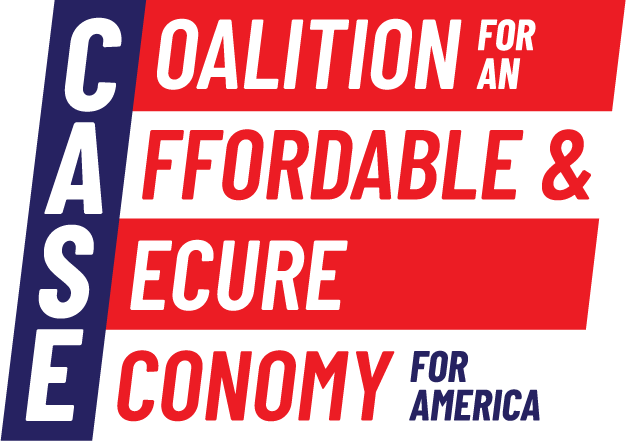As American Families Seek Relief From High Prices, Tariffs Will Make Everyday Goods More Expensive
WASHINGTON – The Coalition for an Affordable and Secure Economy (CASE) for America, which is dedicated to safeguarding American families’ financial well-being and fostering economic growth in communities nationwide, issued the following statement today on President Donald Trump’s tariffs on Canada and Mexico:
“Voters made clear they want a strong economy and lower prices, yet consumer confidence is declining and concerns are rising. Enacting broad-based tariffs will raise prices on everyday goods, threaten jobs and slow economic growth, which ultimately hurt middle- and working-class families the most,” said CASE for America spokesperson Amanda Maddox. “Americans are demanding action on lowering inflation and making daily life more affordable – and they’re paying attention to see who delivers. Policymakers should concentrate on solutions that put more money back into pockets of hardworking American families.”
The rising economic instability has triggered widespread concern among consumers, economists and political strategists alike. Stephen Moore, an economist and supporter of President Trump, told The Wall Street Journal, “The Trump administration needs to keep its eye on what’s happening with prices. It should be a top priority. The trend is a little bit troubling.”
“Moore’s concern comes as no surprise given the series of recent polls that show Americans are increasingly uneasy about the economy and high prices,” Maddox continued.
The Washington Post-Ipsos Poll found:
- Pessimism prevails on specific aspects of the economy, with over nine in 10 expressing negative views about food prices and about three in four feeling negative about gas and energy prices.
- Most people have negative views about the economy, with over 90 percent unhappy about food prices, about 75 percent concerned about gas and energy prices, more than 70 percent unhappy with average Americans’ incomes and a majority criticizing the unemployment rate.
- More than six in 10 Americans oppose tariffs on Canadian goods, and nearly six in 10 oppose them on Mexican products. Americans narrowly support (50 percent to 45 percent) the tariffs on China. Americans also see negative consequences from these actions.
- About seven in 10 say tariffs on products from Mexico, Canada and China will increase prices for those goods. Pluralities also say the tariffs would hurt U.S. workers and U.S. manufacturers.
The Harvard CAPS-Harris Poll found:
- When posed with the question, “What would you say are the most important issues facing the country today?” respondents said price increases/inflation was the top issue.
- Almost one in two say Trump’s steel and aluminum tariffs will harm rather than help.
- A slim majority of voters say tariffs will help get concessions from other countries, but half say the specific tariffs issued by Trump will harm.
- Three in five support placing reciprocal tariffs on goods, but a plurality say this will harm rather than help.
A poll by President Trump’s pollster Fabrizio Ward found:
- “Cost of living” was found to be the top worry among both Trump voters and swing voters.
- The cost of living is the top concern for both Trump voters and swing voters.
- Extending the Tax Cuts and Jobs Act (TCJA) is supported by a 21-point margin, receives majority support (51 percent), and is supported by a 17-point margin among swing voters.
- Around 59 percent of all voters are worried about their personal financial situation, with 53 percent of Trump voters and 61 percent of swing voters expressing concern.
- Among Trump voters, 65 percent are worried about their ability to afford groceries, while 72 percent of swing voters are most worried about this expense
The University of Michigan Survey found:
- Only 16 percent expect their income gains to outpace inflation.
- More than half of consumers expect unemployment to rise in the year ahead, the highest share since the pandemic recession.
- “Consumers’ expectations for the path of inflation worsened considerably this month; they are clearly bracing for a resurgence in inflation,” economist Joanne Hsu, director of the University of Michigan’s Surveys of Consumers said.
###

